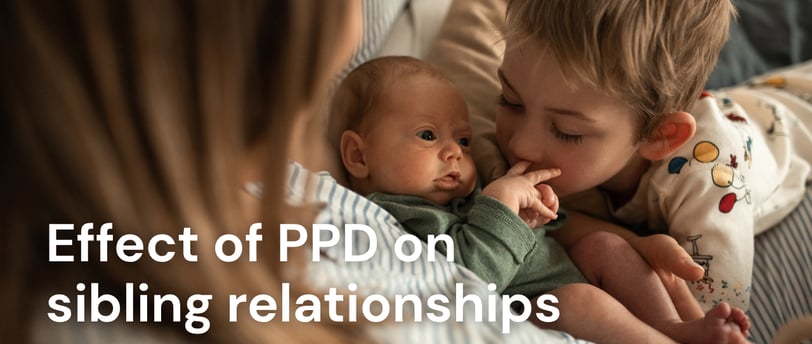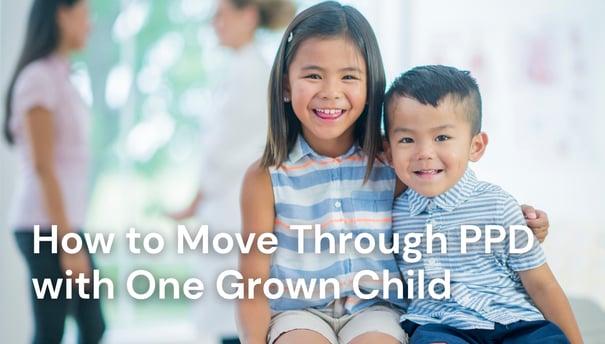The Effect of PPD on Sibling Relationships
7/2/20254 min read


When a new baby arrives, older siblings often face a whirlwind of change—shifting attention, new routines, and a sense that their place in the family is being redefined. Add postpartum depression (PPD) into the equation, and the transition can become even more complex. While much of the conversation around PPD focuses on its impact on the parent-baby bond or partner relationships, one group often overlooked is the older siblings—those quietly absorbing the emotional shifts in their family environment.
At Peace Temple, we often hear from parents who feel heartbroken by the ripple effect PPD has on their older children. Many say, “I can barely take care of the baby, let alone be present for my firstborn,” or “I don’t recognize our relationship anymore.”
The good news? These challenges can be acknowledged, understood, and repaired. With awareness, gentle strategies, and support, families can navigate this season with care—and emerge more connected than before.
How PPD Influences the Parent-Sibling Bond
PPD impacts energy, mood, and emotional availability. These changes don’t just affect how a parent connects with the newborn—they influence how they relate to everyone, including older children.
Common effects include:
Irritability or impatience during interactions
Withdrawal or emotional numbness
Reduced playfulness, storytelling, or affection
Lower tolerance for sibling misbehavior
Feelings of guilt or sadness about “not being enough”
The result? Older children may interpret the changes as rejection, feel confused by their parent’s emotional unavailability, or act out to regain attention.
It’s important to remember: children don’t need perfect parents—they need emotionally present ones, and when PPD interrupts that presence, it helps to name it, support it, and work toward small moments of reconnection.
Sibling Reactions to a Parent’s PPD
Every child responds differently based on age, temperament, and family context. That said, some common sibling reactions include:
1. Regression
Toddlers or young children may revert to behaviors they had previously outgrown—thumb-sucking, bed-wetting, tantrums, clinginess. This is their way of expressing a need for comfort and security.
2. Increased Attention-Seeking
Older siblings might become louder, more defiant, or demand more physical closeness in response to feeling “replaced” or less noticed.
3. Over-Functioning
Some children, especially older ones - may take on caregiving roles, attempting to “help out” or please the parent to restore harmony.
4. Emotional Withdrawal
In some cases, children become quieter, more anxious, or more withdrawn as a way of self-protecting from emotional unpredictability.
At Peace Temple, we help parents understand these behaviors not as misbehavior - but as communication. Your child is trying to make sense of an emotional shift they can feel, but may not understand.
The Role of Guilt—and How to Move Through It
One of the most painful aspects of parenting through PPD is the guilt of not showing up “fully” for all your children. Parents often grieve the temporary loss of connection with their older child. They might ask:
“Will this hurt them long-term?”
“Will they remember me like this?”
“Am I damaging our bond?”
The truth? Children are resilient—and relationships are repairable. What they need most isn’t perfection—it’s the willingness to come back, again and again, in small ways, with warmth and honesty.
At Peace Temple, we remind parents that reconnection is not about grand gestures. It’s about sitting beside your child, even in your fatigue, and saying, “I’m here. I love you. I’m trying.”


Practical Ways to Support Siblings While Managing PPD
Even in the thick of depression, small intentional choices can make a world of difference for sibling relationships.
1. Set Realistic Expectations
You may not be able to do puzzles, cook pancakes, and host dance parties—but you can:
Sit with them while they play
Read one short book
Offer a few minutes of undivided attention
Say, “I can’t play right now, but I love watching you.”
Even brief, consistent moments of connection reinforce emotional safety.
2. Explain What’s Happening (Age-Appropriately)
Children sense more than we think. Instead of avoiding the topic, offer simple explanations:
“Mommy’s heart feels heavy right now, but she’s getting help.”
“Sometimes I seem sad, but it’s not your fault—I love you very much.”
This reduces confusion and prevents them from internalizing the change.
3. Maintain Small Rituals
Routines anchor children. Choose one or two you can keep:
A bedtime hug or story
A morning greeting or song
Weekly “dates” for just 15 minutes
These rituals provide predictability amid the emotional fog.
4. Let Others Help
Ask trusted family or friends to spend time with your older child. Grandparents, neighbors, or community support can offer enrichment and attention when you’re emotionally depleted.
You’re not outsourcing love you’re building a village of support, something we deeply encourage at Peace Temple.
5. Name and Repair After Difficult Moments
If you snap, shut down, or miss a moment, come back to it. Repair is more powerful than perfection.
Say :
“I was really tired and didn’t respond kindly. That wasn’t fair to you.”
“I’m sorry I got angry - I love you, even when things are hard.”
These admissions model emotional honesty and resilience.
When to Seek Additional Support
If sibling dynamics are becoming strained or if your older child is showing signs of significant distress (nightmares, aggression, school refusal, or anxiety), it may be time to involve a child therapist or family counsellor.
Peace Temple’s family support services offer gentle, play-based and parent-inclusive approaches to strengthen bonds even when PPD is in the mix.
Final Thoughts: Repair Is Always Possible
Postpartum depression can disrupt your connection with your children but it doesn’t erase your love. And it certainly doesn’t define your parenting journey. What matters most is your willingness to return, reconnect, and repair.
Children remember how we made them feel over time - not how every day went.
At Peace Temple, we help families navigate postpartum mental health with compassion for the whole system - parents, babies, and siblings alike. Because everyone’s emotional world matters. And everyone can heal.
You are not failing. You are adapting. And your bond with your children - like your own healing—is still growing.
